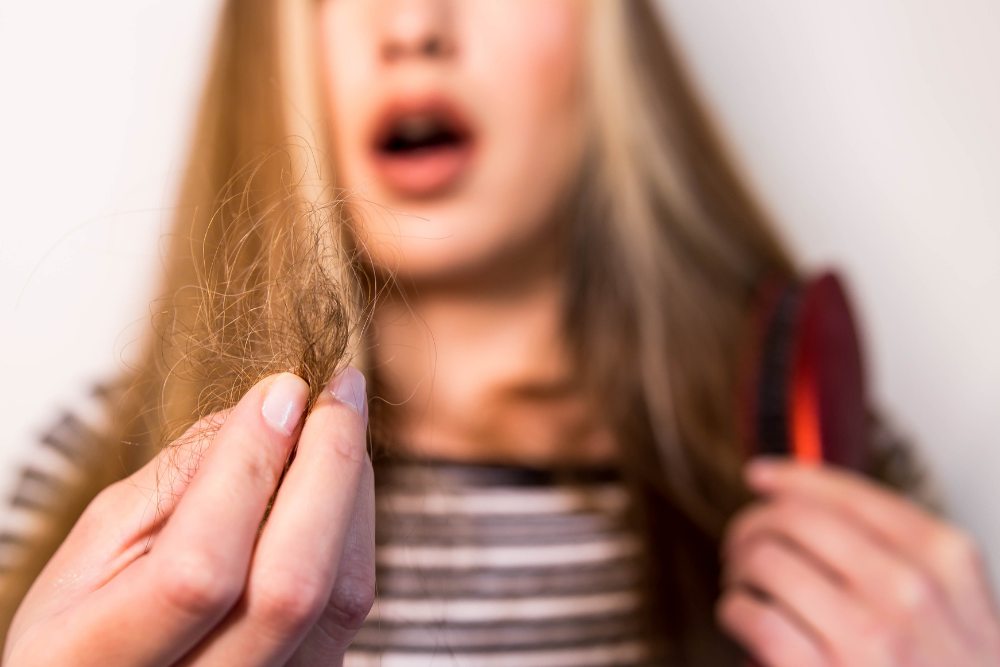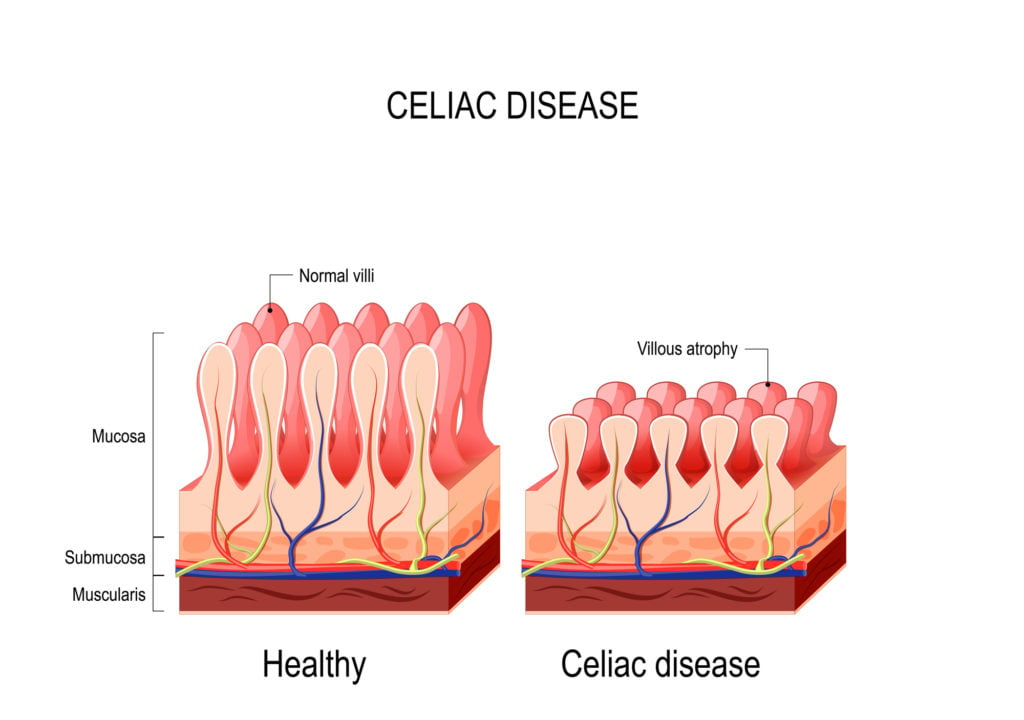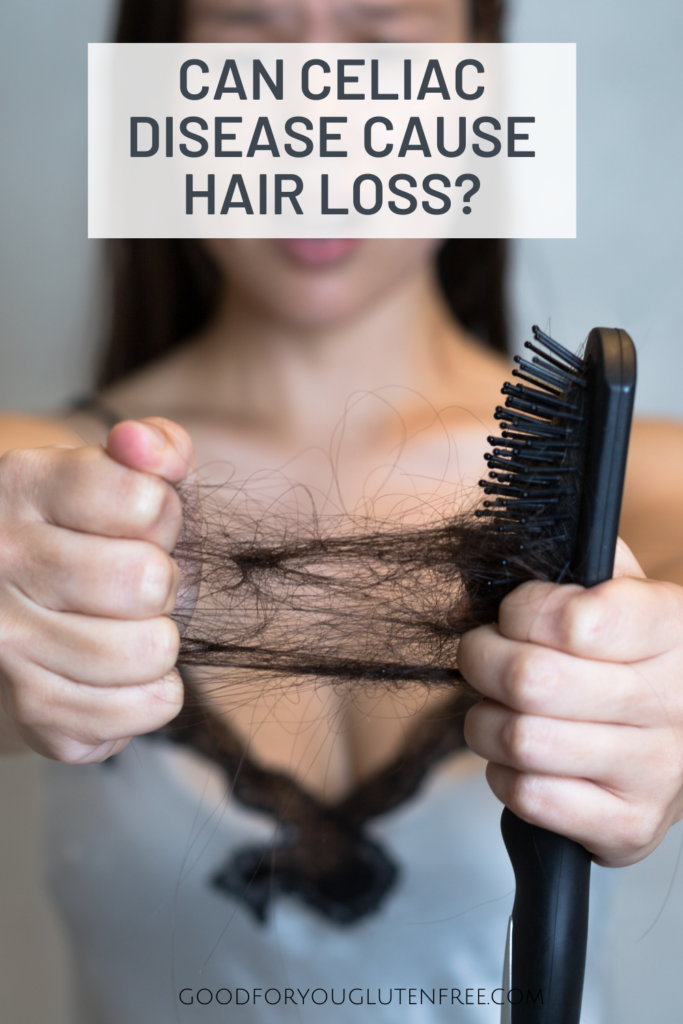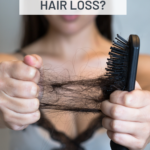
In this article, I’ll explain the connection between celiac disease and hair loss, as well as other potential causes for hair loss, particularly in women. Please discuss the information presented in this article with your physician. This article is not a substitute for medical advice from your doctor. This post contains affiliate links. Please see my disclosures and disclaimers.
Unexplained hair loss can be devastating, especially for women. That’s why when hair loss hits, it hits hard. Losing hair feels like you’re losing a piece of your identity.
And while your hair texture and color will change as you age, rapid or unexplained hair loss, especially for those who are not yet of “mature” age, maybe a sign that there’s something more at play than aging.
If you’re experiencing random hair loss, please talk to your doctor. Hair loss may be a serious condition – like celiac disease, thyroid disease, or hormonal imbalances – and it may require medical intervention.
In this article, I will share some of the main causes of hair loss and help you get a better understanding of the connection between celiac disease and hair loss.
Celiac Disease and Hair Loss
Celiac disease affects three million people in the U.S. and is classified as an autoimmune disease. Celiac disease is the only autoimmune disease in the world where the trigger or cause (gluten) is known. (See: What Causes Celiac Disease and Can It Be Prevented?)
Those diagnosed with celiac disease must adhere to a strict, lifelong medically-required gluten-free diet in order to treat and manage their disease. There are no pills, vaccines, surgical procedures, or magic potions to make celiac disease go away.
Gluten, a protein found in wheat, barley, rye, and derivatives of these grains, is extremely hard to avoid. Gluten is hidden in many surprise products and makes eating at restaurants a challenge for celiac disease sufferers.
One of the many symptoms of celiac disease is intestinal malabsorption, which is a fancy way of saying your body isn’t properly absorbing nutrients from the food you eat.
Intestinal malabsorption leads to malnutrition and nutritional deficiencies, and such nutritional deficiencies can lead to a slew of ailments, including but not limited to skin rashes and hair loss.
Every time someone with celiac disease eats gluten, their body’s immune system mistakenly attacks the healthy tissue surrounding their small intestine, and damages and flattens the villi, which are the finger-like follicles surrounding the small intestine.
Over time, the small intestine becomes so damaged that it can’t properly do its important job of feeding every organ and cell in your body.

The small intestine is the workhorse of the digestive system, constantly extracting nutrients from the food you eat and then distributing those nutrients to your brain and body.
Because the small intestine is impaired in people with untreated or unmanaged celiac disease, most people with the disorder suffer from nutritional deficiencies, which often affect their hair, skin, and nails in addition to many of the body’s essential functions.
Unfortunately, most people with celiac disease don’t know they have it. In fact, 97 percent of those living with celiac disease remain undiagnosed, according to the Celiac Disease Center at the University of Chicago.
Despite all the advocacy for the gluten-free diet, people still do not know they have celiac disease, perhaps due to the numerous and mysterious ways celiac disease presents itself. Many of those undiagnosed are living with silent celiac disease or asymptomatic celiac.
If you’re experiencing hair loss, ask your doctor to test you for celiac, or take matters into your own hands and order an at-home celiac disease test. At-home celiac tests are reliable and accurate as they are the same blood test your doctor would order in his or her office.
You can then take the results to your doctor to discuss the next steps regardless if the test is positive or negative. You can order an at-home celiac test at this site.
Can Hair Loss from Celiac Disease Be Reversed?
Once you’re diagnosed with celiac disease, the only treatment option is a strict, lifelong gluten-free diet.
The good news is that many people with celiac disease go on to live long and healthy lives with plenty of hair on their heads. In fact, once you get your celiac disease in check and your nutritional deficiencies are resolved, hair loss will likely be a thing of the past.
Just keep in mind that it can take your body time to heal and adjust post-diagnosis. A gluten-free diet, supplementation (which I write about in my book), and healthy lifestyle changes can accelerate the healing process.

Other Causes of Hair Loss
While celiac disease is an autoimmune disease that, if untreated, may result in hair loss, there are many other reasons you may be losing your hair. This is why it’s extremely important to discuss your hair loss, and other health concerns, with your doctor.
For informational purposes, I’d like to share some of the other potential causes for hair loss.
(1) Alopecia Areata
Like celiac disease, alopecia areata is an autoimmune disease. Alopecia occurs when your immune system mistakenly attacks your hair follicles, which are responsible for holding your hair in place. This results in hair loss, typically in smooth patches, that may eventually lead to full hair loss. There is no cure for alopecia.
Some studies have found a strong connection between undiagnosed celiac disease and alopecia areata. In 2014, researchers found that five out of the 12 children with alopecia they studied also had positive anti-tissue transglutaminase IgA (TTG-IgA), a clear indicator of celiac disease. Upon biopsy, all five of the subjects were diagnosed with celiac disease.
Researchers say there may be correlations between those with silent celiac disease and alopecia areata, and they recommend that children suffering from alopecia be tested for celiac disease.
Alopecia areata is not to be confused with androgenic alopecia, which is hereditary hair loss that usually starts with overall thinning or a widening part in women and a receding hairline or bald spot at the top of a man’s head. Androgenic alopecia is often treated with minoxidil, corticosteroids, and other agents.
(2) Hashimoto’s Thyroiditis
Hashimoto’s thyroiditis is a form of hypothyroidism and is also classified as an autoimmune disease, just like celiac disease. In patients with Hashimoto’s, the immune system mistakenly attacks the thyroid.
Many people don’t realize how this tiny, butterfly-shaped gland can impact your whole body health, but it does. The thyroid is constantly releasing thyroid hormones that control metabolism, a process where food is converted into energy.
When the thyroid is under attack, its ability to produce the hormones needed to keep your body functioning properly is at risk. You may lack energy, gain weight, or suffer from hair loss as a result. Your thyroid will naturally prioritize major organs at times of impaired function, and your hair isn’t exactly at the top of its priority list.
Researchers have found that, among autoimmune disorders, there is an increased prevalence (2-5%) of celiac disease in people with autoimmune thyroid disease. Other studies have shown that people with celiac disease are four times more likely to also have Hashimoto’s, potentially due to a common genetic predisposition.
Hashimoto’s is not curable, but it can be treated with a medication called levothyroxine, which replaces the missing hormone once naturally produced by the thyroid gland. People on levothyroxine will find their energy improves, and many of their symptoms, including hair loss, dissipate over time.
(3) Hormone Changes
Hormone changes and imbalances caused by various ailments, including polycystic ovary syndrome (PCOS), thyroid hormones, diseases, and some medications, can lead to hair thinning and hair loss in women.
During perimenopause and menopause, for example, a woman’s estrogen and progesterone levels fluctuate and decrease, which can lead to thinning hair during this period in a woman’s life.
I experienced hair loss and thinning when I quit the birth control period and as my hormones adjusted. This is known as post-birth control syndrome, and like many women quitting the pill, it was a difficult period in my life.
If you’re thinking of quitting birth control and balancing your hormones in the aftermath, read Beyond the Pill by Dr. Jolene Brighton.
(4) Stress
High levels of stress also contribute to hair loss. This phenomenon is known as telogen effluvium.
The human scalp has approximately 100,000 hair follicles, and these follicles cycle between the growth and rest phases. The resting phase, known as telogen, is when the scalp sheds hair.
During the telogen effluvium phase, a trigger, such as stress caused by a traumatic incident, depression, death in the family, divorce, etc., can send all the follicles into the telogen (shed) phase abruptly and all at once.
Stress-induced hair loss is usually temporary and typically resolves itself when the stressor is no longer present. Regular exercise, meditation, fresh air, and rest or downtime will help you keep your stress in check, improve your overall health, and keep those precious hair follicles in place.
Next Steps
Bottom line, hair loss is often the sign of a more serious underlying condition. Please discuss any symptoms you experience with your doctor and get tested for celiac disease, thyroid disease, alopecia, and/or a hormone imbalance. Also, look for ways to reduce stress and strife in your life.
Remember, hair loss is typically the sign of something more at play inside your body. It should be taken seriously before it turns into something even more serious and potentially irreversible.

I have celiac disease. I notices a rash, small raised red spots, on my upper arm and on my groin.
I appreciate the pictures you showed of how it looks. Your explanations were informative and the best detail I have read for dermatitis herpetiformis, which my dermatologist says I have. Please keep sending us good articles. You are making it easier to live with CD. Eating out and snacks with soy are the hardest to figure out on foods/labels.
Very informative. Thanks for sharing. i really appreciate the the effort which the author has put in.